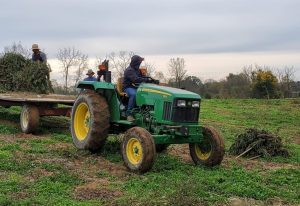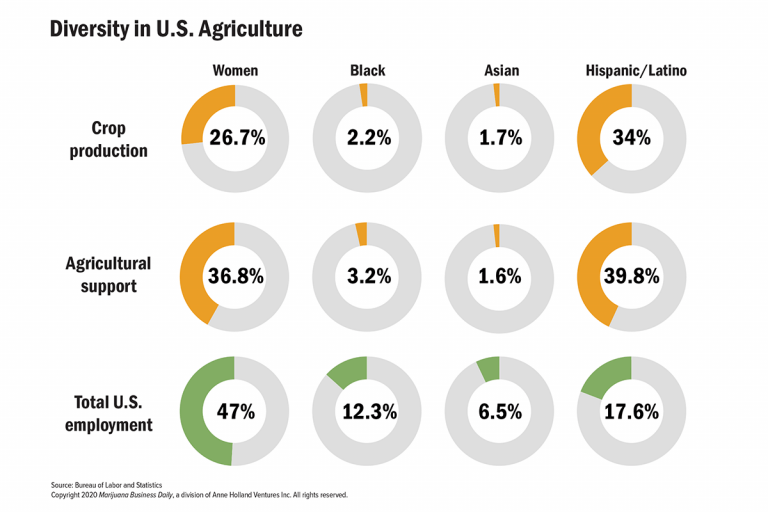
(This story appears in the October issue of Marijuana Business Magazine)
People of all ethnicities want to feel comfortable in the workplace, and that often begins with seeing faces that look like their own represented within their company and the industry as a whole. It also means seeing a clear path for advancement within an organization beyond becoming a token employee or “checking a box” and feeling a connection with the company’s mission.
According to the U.S. Department of Agriculture’s 2017 Census of Agriculture, 95% of American farm producers were white, the average age was 57.5 and producers had been on their current farm for an average of 21.3 years. Those trends project into the hemp industry, as many farmers of traditional crops are diversifying into hemp production.
Non-farm agribusinesses often are less diverse than other industries as well. And yet, farms and agricultural businesses perennially complain about a talent shortage. Securing high-level managers and growers can take up to a year in some cases because of increasing competition within agriculture and other industries.

Diversity in Hemp
In the agriculturally focused hemp space, Jackson Garth, CEO of Atlanta-based hemp and CBD company Verde Leaf Group, said he had to build his own vertically integrated seed-to-store company and related ancillary businesses to have the opportunities he wanted to achieve as a Black businessman who didn’t grow up on a farm. He’s now working to develop a diverse workforce within his own company as well as connecting people of color—whether farmers or executives—with other companies in the industry.
For people of color, it’s all about access, Garth said.

Jackson Garth
“Black people and Latinos are qualified, but if you don’t give us a shot, then how do you see how we perform?” Garth said. “Let me in the door and let me show you what I can do.”
Limiting workforce diversity also limits the company’s view and potential profit centers, according to Garth.
“It’s like trying to get to one store,” Garth said. “When you have a diverse workforce, it’s kind of like having all these different streets to get to your end goal—and that’s invaluable because you’re going to hit so many different roadblocks.”
Benefit for Business
Companies need to take a macroeconomics–type view toward the end result, according to Andrei McQuillan, vice president of sales and marketing for EcoGen Laboratories, a vertically integrated hemp and CBD company based in Grand Junction, Colorado.

Andrei McQuillan
“The only way any company in America is going to truly embrace diversity to the core is when it has a positive impact on their revenue and their finances and the economics of the business,” McQuillan said.
Diversification can have geographical limitations as well—especially in an agriculturally based industry like hemp. Attracting people of color to rural areas might seem challenging when hemp businesses are competing with more diverse industries in urban centers.
If hemp companies are serious about wanting to recruit people of color, they might need to employ creative recruitment strategies, said Ru Johnson, a board member with the Minority Cannabis Business Association and executive producer at Denver-based Roux Black Consulting.
“This is where people really have to get outside of their comfort zones,” Johnson said. “The onus is on the company to create a stronger, more diverse look and feel for their company. And it has to do with education, with marketing of their company, with more inclusive information and with more inclusive images on their website.”
Hemp companies can also solve geographical personnel recruitment issues by accommodating flexible schedules and remote work—especially for those in executive roles—and recruiting from adjacent consumer packaged goods industries, according to McQuillan, who joined EcoGen with a background in the spirits and entertainment industries.
Beyond traditional college recruiting centers, hemp companies should also consider visiting historically Black colleges and universities, several of which are agriculturally focused. It also helps to have people of color in leadership positions who can help recruit, McQuillan said.
Jeff Gray of SC Labs based in Santa Cruz, California, said his company works with the Society for Advancement of Chicanos/Hispanics and Native Americans in Science (SACNAS) and the University of California, Santa Cruz to recruit minority students with STEM majors into the cannabis industry.
Ultimately, becoming more inclusive in hiring and retaining a diverse workforce has to be authentic—and that starts at the top, Gray said.
“Keep diversity and inclusion as an ongoing priority and find allies,” Gray said. “Recruiting for the best talent is always difficult, and this is no different. So create a plan, assess your practices and maintain this as a priority.
Laura Drotleff can be reached at [email protected]

